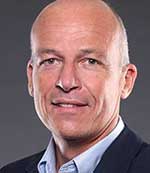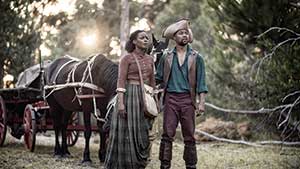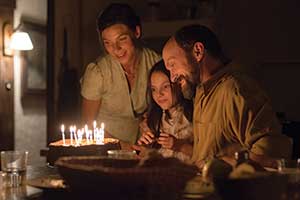This year’s models
Posted By richm On 17-12-2014 @ 3:27 pm In Features | Comments Disabled
Plenty of ambitious new dramas launched this fall season, but the funding models behind them are as varied as their plotlines. Richard Middleton reports.

Joel Denton
There may well be more cash sloshing around the scripted programming business than ever before but the market has never been more complicated.
Funding pots have expanded as networks seek to recreate the cinematic experience on the small screen, producing bigger and better shows. Private equity investors have dipped their toes in the market to see if they can replicate their success with feature films in the TV world, while those with smaller budgets are embracing shorter production cycles and like-minded international partners to bring more ambitious shows to fruition.
There are common factors uniting the diverse scripted fare being traded, not least the fact that these new funding mechanisms are being driven by the proliferation of platforms.
“There’s an awful lot more drama being made,” says Joel Denton, newly appointed MD of international content sales and partnerships at A+E Networks, who is looking to presell American revolution miniseries Sons of Liberty, made by his company’s fledgling subsidiary A+E Studios for History in the US.
“As markets have more platforms, as is the case in the UK and US, the larger channels that have been used to fully funding dramas, such as Fox, NBC and the BBC, are under greater pressure as the viewing audience splits up. Broadcasters have less money to spend per show and that’s driving them to look at different funding models.”
Coproduction collisions
Coproductions are perhaps the most obvious method of pulling together a funding pot but there’s little doubt some shows have been thrown off the rails as the need for partners clashed with the overall creative vision.
“What is a true coproduction?” asks Denton. “It seems to mean a huge number of different things to different people. My feeling is that people have realised that you need a singular – and usually very singular – unit to drive interesting creative work. Maybe you have lots of people buying into that vision but it is usually driven by the writer and director.”

The Missing
Carrie Stein, executive VP of global production at Canadian outfit Entertainment One (eOne), agrees that a dominant creative force is key. She has been pulling together coproductions since 2006 and her latest endeavour, Book of Negroes, an adaptation of Lawrence Hill’s 2007 novel about slavery, is no different.
“Coproductions come in all packages, and I’m not sure if one or another is preferable,” she says. “Most of us who work in this space do think, however, that having one lead broadcaster is ideal. If you start with two you can suss out pretty quickly if you’re all on the same page.”
And that page doesn’t necessarily have to be written in the same language. Ben Donald, exec producer for international drama at BBC Worldwide (BBCWW), is behind The Refugees, one of the more unusual coproductions around. The show will air on Atresmedia’s LaSexta in Spain and is being sold by BBCWW but is as close to a true coproduction as it’s possible to get.
The series explores the impact on a small rural community when millions of refugees from the future travel back in time to seek shelter in the present. It is being made by Madrid’s Bambú Producciones and has been created by Spaniards but features a British cast and writer to ensure it has international appeal – a stipulation of BBCWW’s involvement.
Donald says it is a “cost-effective” production, with the budget split equally between BBCWW and Atresmedia, and a per-episode cost far below that found in the US. Without being specific, he contrasts the US$4m per episode common in the US with the €600,000 for Spanish top-end drama. “And we’re making this for a secondary channel,” he adds.
The balance between BBCWW and Atresmedia, which are each putting up half the budget and will recoup the same proportion of revenue, was reflected in every aspect of the production, with scripts being translated and creative visions discussed, says Donald.

The Book of Negroes
While the budget for Book of Negroes might have differed, with stars like Cuba Gooding Jr and Louis Gossett Jr onboard, Stein’s challenge was remarkably similar. Requiring a substantial funding pot meant the search was on for a suitable US network that could work with the commissioning broadcaster, CBC of Canada.
“It was all about finding the right buyer that needed that show,” she says. “US network BET had never done event programming but it had aired Roots a few months earlier and was stunned to see it had four million viewers. It sat up and realised it could draw an audience for the right type of show, and Book of Negroes crossed its desk several weeks later.”
BET contributed around a quarter of the budget, which was put together with eOne’s distribution advance against worldwide rights and CBC’s input. The final parts of the jigsaw were completed with tax credits from South Africa and Canada. The two countries featured in the novel so, with the addition of the tax incentive, were obvious locations in which to shoot.
It also helped that BET was willing to allow CBC to lead the production, Stein says, providing “intelligent notes but letting the team do its job.”
As dramas become more ambitious, and costs subsequently rise, bringing in more partners is sometimes seen as a way to plug funding gaps. But turning productions into a numbers game is almost universally dismissed as a viable model, and almost every exec we spoke to has a tale to tell about the downside of allowing too many cooks into the kitchen.

Refugees
Craig Cegielski, FremantleMedia North America’s exec VP of scripted programming and development, is better versed than many in the challenges and opportunities that coproductions can bring. Having previously worked for Lionsgate International Television, GK-TV and Paramount Pictures, among others, he is now launching The Returned, the US remake of the Canal+ thriller Les Revenants.
“I’ve worked on coproductions that ranged from three to six partners and they all brought issues because you’re trying to serve so many masters who all want a position at the table,” he says. “Everybody who is willing to put money at risk deserves to be listened to, so they can get what they need from their investment, but often in a coproduction chasing money and choosing smart creative partnerships can be at odds with each other.”
A+E’s Denton argues that networks are far more aware of the risks associated with coproduction than they used to be and cites the increase in the use of drama formats as one of the ways broadcasters have cut the risks of high-cost scripted series.
The Returned reflects this, because although it is being coproduced, FremantleMedia’s only partner is A+E Studios. The deal, according to Cegielski, is part of a wider strategic play for both companies as they pursue their creative ambitions. “A+E has the appetite, the network bandwidth and the reach with regards to viewership. They have an executive who championed the show and they have the shelf space,” he says.

Cameron Roach
“It’s an absolutely equitable coproduction and the balance of power is equal. We work hand-in-glove and it’s been an experience that we wouldn’t mind replicating. The intent with respect to physical production, creative development, execution, marketing and timeslot has been the same and everyone talks in the same way. There isn’t what you’d consider a traditional powerplay, with opposing ideas and agendas.”
In that situation, the key is to provide “the 30,000ft view of what the asset’s value is, where it can go and what it can do, and not be under pressure from a legacy business that has an ulterior motive,” says Cegielski.
Caroline Torrance, head of international scripted at Zodiak Rights, is equally wary of the dangers that come from the addition of numerous copro partners, despite the financing solutions they might provide. “It would be almost impossible to have more than three partners for editorial input because you’d cripple yourself in terms of trying to consult everyone and take everyone’s views onboard,” she says.
Zodiak is by no means averse to new funding models, however, and has two projects that illustrate the diverse methods used in today’s scripted industry.
Occupied employs the traditional copro model, with Zodiak-owned Yellow Bird and GTV coproducing along with TV2 in Norway and Franco-German cultural channel Arte. This is supplemented by other local and national tax incentives from the countries involved. Meanwhile, The Pinkertons incorporates many elements of the film industry’s financing model.
Equitable involvement
The Pinkertons follows the story of the real-life detective agency set up in the American West during the 19th century. Zodiak Rights, which is contributing around 20% of the budget upfront, is onboard as distributor.

Aquarius
The 22-parter was developed by Rosetta Media and Buffalo Gal Pictures, with entertainment agency Peleton Entertainment arranging the financing. The opportunity to produce scripted drama for the US first-run syndication market was key to its creation.
“We identified the station groups we wanted for domestic distribution and hired Rohrs Media Group to distribute there,” says Todd Berger, financier at Peleton, which acquired Berger’s Creative Media in January.
Following clearances from a number of US stations and a licence fee from Canadian network CHCH TV, private equity was used to support the production, with investors set to receive a return on their investment from the barter deals agreed with
the US station groups. An international distributor was then found in Zodiak Rights, while shooting in Manitoba, Canada, has provided tax credits to the tune of 40% of the budget, Berger says.
A credit to the tax system
The Pinkertons, like almost every other show currently available, also provides a telling insight into the importance of tax credits.
“Tax money is an intrinsic part of almost any scripted show now getting made that has large ambitions and a decent budget,” Denton says. “It is almost impossible to make them at the level you need to make them and raise the cash you need without a decent chunk of tax rebate.”
The joy, as he puts it, is the speed in which such credits have spread around the world as countries clamour for big-budget shows such as Game of Thrones to set up production in their territories.
Few nations have been more effective in attracting productions than Canada, says Noel Hedges, senior VP of acquisitions at UK-based distributor DRG, which has lined up Strange Empire as its tentpole scripted series. The show, set on the frontier between Montana in the US and the Canadian state of Alberta in the 1860s, follows three women who are brought together by a series of murders.

Noel Hedges
Hedges first heard of the project three years ago and followed it through the development process until it was commissioned by Canada’s CBC. It was only then that he came onboard. “You don’t really know what your exposure is going to be or what the value of the project is before then,” he says.
With the combination of CBC’s investment, gap funding from DRG plus tax credits and soft money from state and national sources in Canada, production was able to begin in May. “It’s a good example of Canadian productions benefiting from their own system,” says Hedges. “For a period drama, you need a certain budget with a certain quality and Canada’s system brings a lot of incentives to the table.”
And that means you can realise your creative vision without requiring numerous partners, each with their own ideas about what the show should be. That’s not to say the Canadian tax credit system provides the key ingredient for broadcaster/producer coproductions to replicate.
Patrick Spence, founder of UK prodco Fifty Fathoms, recently experienced first-hand the toss-up between tax rebate and creative vision with Fortitude, the upcoming murder mystery that will air on Pivot in the US and Sky Atlantic in the UK. It is being sold by Sky Vision, which has already secured 10 pre-sales for the show.
Spence looked at 10 locations in Canada as well as various towns in Norway. The former would have provided a greater contribution to the pot while the latter was far easier to access. In the end, he chose a remote village in Iceland. “We needed to be by the sea but the places we saw in Canada felt quite Canadian, and Norway felt too Norwegian. This one small town in Iceland was the place where we felt the architecture matched the world we were trying to recreate,” he says.
However, Strange Empire’s setting, straddling the US/Canadian border, helped it to take advantage of the latter’s rebate system.
American partners
Both Fortitude and Strange Empire also brought another key element to the funding pot: the US network. Aside from the obvious cash injection, the addition of an American partner can be a key aspect of a show’s global appeal, although Hedges says selling to a major UK channel can have a similar effect.
“Strange Empire is a striking and original project but obviously as a distributor I live for marketing, so if it goes on to a good cable network in the US it helps enormously,” says Hedges. “It means there’s another vote of confidence, in the same way it would if I sell to a UK broadcaster.”
Louise Pedersen, MD of All3Media International, agrees that finding a US broadcaster will always help to drive a show, and says that securing Starz as a coproducer on its upcoming thriller The Missing, which explores the actions of a father whose child is abducted, was a coup.
Although unwilling to discuss figures, Pedersen suggests the traditional distributor contribution of 20-25% of the budget is typical of many deals, although amounts can range from 10% of the budget to 30%.
The Missing is written by brothers Harry and Jack Williams and produced by Charlie Pattinson’s New Pictures, along with All3Media-owned Company Pictures, in association with the Williams’ UK prodco Two Brothers Pictures and Collin Callender’s Playground. The show will air simultaneously on Starz and the BBC in the UK – which Pedersen cites as a major factor in the show’s ability to attract money. BBCWW in Australia is also onboard.
Copro partnerships between US and UK broadcasters are not without their challenges, however, despite the funding advantages. Sky Atlantic initially linked up with Starz on Fortitude, but the network pulled out after the show’s path to transmission failed to fit into its plans.
Cameron Roach, acting head of drama at Sky Entertainment, says: “One of the complexities of having a partner broadcaster is people wanting to hit transmission dates at a similar time, and Starz was our creative partner. Unfortunately, we both had slightly different timescales, so we had to find a new partner. But because the show was talked about and had kudos, Pivot was forthcoming.”
Pedersen says US involvement at any stage bolsters a show’s international appeal. “The fact Starz was onboard was very useful in teasing the show internationally, as is the arrival of [French network] TF1 for other major European broadcasters.”
The French connection, which was “more of a presale,” says Pedersen, highlights what is often the last addition to the pot. However, if your funding is already in place it can be worth holding back on presales, says Stein at eOne. The cast for Book of Negroes came together three weeks before shooting, by which time presales were no longer necessary. “At that point you’re better off waiting to make your sales in the key territories, because now you have really interesting talent onboard and, if you do the job right, the production will speak for itself,” she says.
That said, presales remain a key aspect of scripted funding. UK company ITV Studios has used its own funding might to strike what is perhaps the most streamlined deal possible for its crime series Aquarius.
The show was ordered by US network NBC and is being produced by Tomorrow ITV Studios, a joint venture between ITV Studios America and Marty Edelstein Productions. “In terms of how the deal has been put together, it’s all within the ITV family, with Tomorrow ITV Studios producing and ITV Studios Global Entertainment [ITVSGE] distributing,” explains Ruth Clarke, senior VP and director of acquisitions and coproductions at ITVSGE.
The crime series, starring David Duchovny as an LA cop on the trail of Charles Manson, will be presold prior to its arrival on NBC next year, but Clarke says the show is very much designed for the US network, which has driven the creative.
Stein admits that in some cases presales can help to get a show off the ground but describes them as “a challenging juggling act.” The trick is to get US partners onboard earlier so they can influence a show, she says, but the relatively small number of series being coproduced is an obstacle. “I’ve been doing the international model for 10 years and it’s still early days,” says Stein. “Maybe the German market will do two or three English-language coproductions this year. It’s not a lot in the scheme of things, compared with how many shows we develop in the US.”
Alongside traditional presales to linear networks, the VoD market is having an important impact on funding at the back end, says Clarke.
ITVSGE has already struck numerous agreements for secondary windows with VoD services, including period drama Mr Selfridge, which aired initially on PBS in the US and ITV in the UK. Since then it has pulled in more revenue through a US second window on Amazon’s Prime Instant Video service, while subscription VoD rights in the rest of the world are with Netflix. “Through the strength of that show we can leverage a relationship with both those partners, which is a really interesting way of working,” Clarke says.
SVoD operators are clearly set to further affect the way drama is funded, particularly given the success of House of Cards on Netflix, and their platforms are increasingly being viewed as another avenue for coproductions and presales.
What is abundantly clear, however, is that as long as scripted remains hot, new funding models will be developed and the range of genres on offer – from sci-fi to Westerns, crime series to period drama – will only grow.
Detecting private equity finance
Unlike most dramas around at the moment, private equity financing was vital to Wild West detective series The Pinkertons.
“We’re looking at the independent film finance model and applying it to television,” says Todd Berger, financier at Peleton Entertainment, which put together funding for the show.
At the heart of the production was investment from private equity sources, which equates to more than 30% of the budget. Then there’s Canadian tax credits, which make up about 40%, foreign distribution, which added 20%, and a Canadian licence deal.
The show has been made for the US syndication market and Berger says organising that end of the funding was the trickiest part. The challenge of the model is to raise equity against the value of the barter, which isn’t bankable until after the show has aired.
“It’s a unique set-up. We’re the first original scripted drama series to be in this market for a while, but we are the first people to really use private equity,” he says.
The firm is working with an entertainment lender that will provide interim financing while all the pieces come together.
Berger admits it can be an “exciting” process. “It’s not for the faint of heart, it’s been hands-down the most challenging thing for all of us involved, but the great thing is the producers are the studio, so they own the show. That hasn’t been available until recently.”
Article printed from C21Media: https://www.c21media.net
URL to article: https://www.c21media.net/this-years-models/
Click here to print.